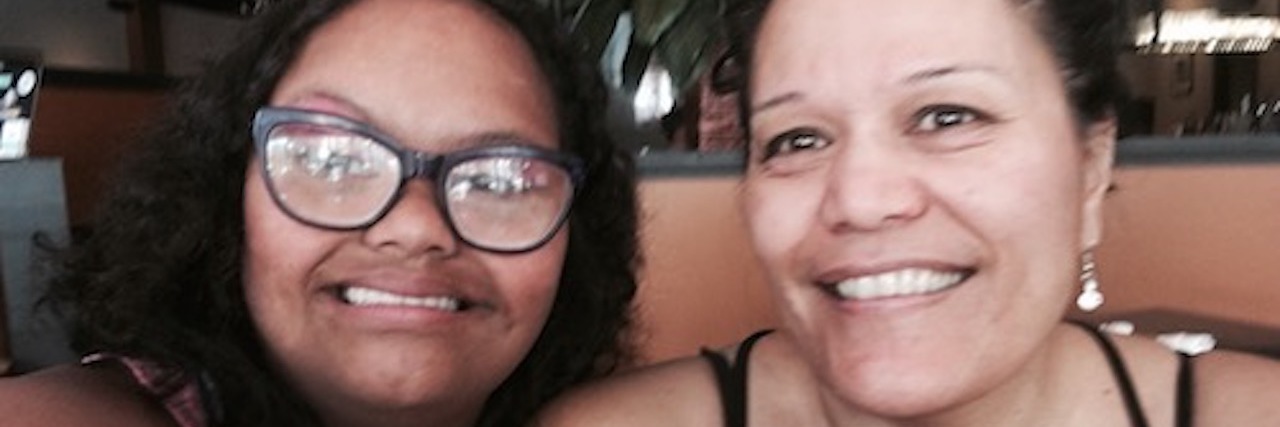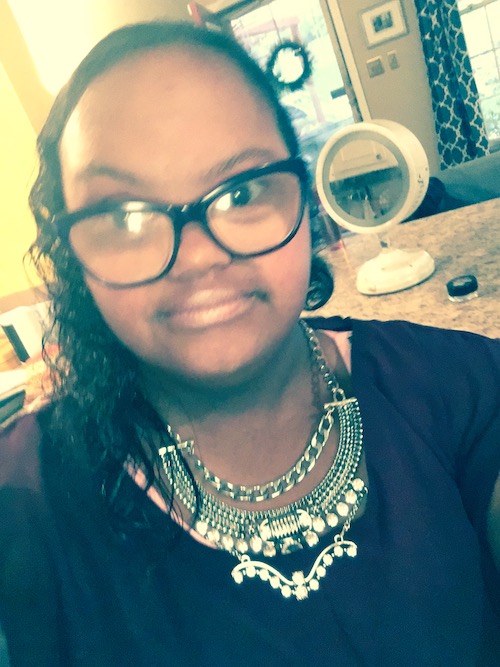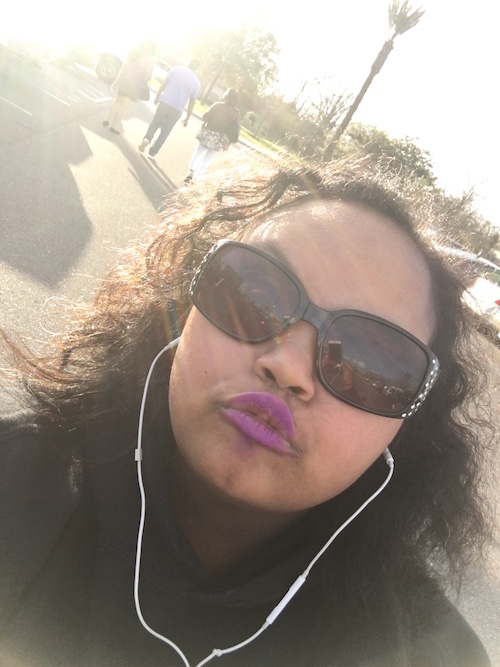Until 2002, I had no idea what was Down syndrome was and how it impact my life. It seems just like yesterday when I was 38 years old and pregnant. I was considered high-risk, which landed me at the geneticist office of Research Medical Center in Kansas City. I had to undergo a prenatal test to assess if my baby had a disability.
Sure enough, the geneticist showed me the distinctive marks of Down syndrome on my unborn baby’s X-ray. Because of the health issues children with Down syndrome are born with, she recommended termination of my pregnancy. My husband Jerome and I decided against termination. This unborn baby was our child — regardless of the diagnosis.
D’Andra Aloha was born on April 18, 2002 at Research Medical Center. Tomorrow she turns 16 years old and her life has completely changed mine. Raising her has narrowed my circle of friends, turned me into a political liberal and advocate for people with disabilities and redefined my faith.
I use to be what Sarah Bessey calls one of those happy-clappy-Charismaniacs that assumed she would be miraculously healed, give her testimony on stage and have a worldwide ministry. As the years passed, in stormy seasons I got mad at God. I tried talking about my struggle with some people in the community of faith I was a part of, but was met with the, “You need to do more, pray more, believe more” along with being made to feel I was a bad mom. I quit talking to anyone in this community and connected with moms who have children with disabilities.
Other friends with children with disabilities became a lifeline for me, as well as a local group. Raising D’Andra made me a member of a worldwide tribe of parents and caregivers who love and care for people with disabilities. I left that community of faith in hopes of finding a church with more experience working with teens with disabilities such as D’Andra.
I’ve landed at a church that doesn’t necessarily have a ministry to teens with disabilities. However, my daughter isn’t intimidated by the size of the crowd here. When she attends, she is accepted and loved. It’s not a perfect set up by any means. Still, this new season has brought a lot of healing and wholeness for myself — from years of feeling condemned or like a failure because I never measured up and fit in. Like any major transition, there is so much more to the story that I don’t want to talk about yet (unless we’re having coffee as close friends.)
D’Andra turns 16 tomorrow and loving her has taught me these unswerving principles:
1. Be true to who you are.
D’Andra is true to who she is and this has set me free to be true to who I am. She can spot a fake person a mile away and her outspokenness and truthfulness can be charming and inappropriate at the same time. She is true to who she is because she can’t pretend or be fake. Her authenticity has given me freedom to be more transparent, even though other people may perceive this as being inappropriate.
2. Love unconditionally.
D’Andra loves people regardless of how they treat her. I love her freedom with loving people even if they are rude. Which brings me to my next point…
3. People can be rude and uncaring and that’s OK.
D’Andra doesn’t take rudeness or the lack of care personally. She is quick to forgive and let go.
4. Dressing up and wearing makeup is loving yourself.
D’Andra dresses up for school every day in a dress, jewelry and makeup. She enjoys breaking fashion rules by pairing a dress with torn jeans. Her freedom to experiment with clothes has made me more relaxed in not having to appear perfect all the time.
5. Love yourself.
D’Andra struggled with hating herself because she has Down syndrome. Walking with her through this struggle has made me face my own self-hatred. I use to hate myself because I didn’t feel like I fit in, belonged or measured up to standards set by people I had respected. I’ve learned from D’Andra that I need to love myself to thrive. This means that I don’t need everyone’s approval or admiration. I don’t have to fit in and belong, because I belong to myself and to God alone. I’ve learned the necessity of loving myself by loving her which caused me to set boundaries and narrow my circle. As she learns to love who she is in her own skin, I’ve learned to love who God made me in my frailty and weakness.
6. Being alone is OK.
Most teen girl movies have an attractive or nerdy turned beauty star with a tribe of girls. One time I hosted a holiday party and invited D’Andra’s class. For 30 minutes no one appeared. She was fine with no one coming to her party until one boy came with a gift. She doesn’t need a ton of friends or a tribe of girls. She is OK with times when she is alone.
7. You don’t need a lot of friends.
D’Andra has two friends at school: Ariel and Christian. Raising her has narrowed my own circle of close friends to friends who can empathize with parenting a child with disabilities or who have a child with disabilities. My Facebook says I have over 2,000 friends, but truthfully, I probably have a handful of friends, which is fine.
8. Family comes first.
I was part of a church where church came first. After she was born, I literally had to drop a lot of extra-curricular activities to take care of her. I realized how I idolized leadership and the church. I couldn’t be involved in every church activity or volunteer for every project. She came first which redefined serving God and faith for me. This scripture became a revelation for me as I readjusted my life to take care of her and my sons and niece: “If anyone fails to provide for his own, and especially for those of his own family, he has denied the faith [by disregarding its precepts] and is worse than an unbeliever [who fulfills his obligation in these matters].” I Timothy 5:8
9. Saying no is OK.
I thought saying no to church activities was a sin. I learned saying no is OK for the sake of my mental health. Saying no to volunteering meant saying yes to spending more time with her and my family.
10. You don’t need to go out all the time.
D’Andra is happy being at home with her family. When I was her age, I wanted to go out all the time with my friends. She has helped me appreciate the simplicity of being at home with family.
11. Popularity is overrated.
Teenage girls are pressured to be popular by our culture. This is overrated and fortunately D’Andra hasn’t caved to that deception. Teenage girls should be free to be who they are without expectations of perfection and popularity.
12. Developmental milestones are guidelines.
We talked to a 27-year-old woman with Down syndrome during a recent clinic visit. She told D’Andra that she had a job, a boyfriend and a great life. D’Andra listened closely and loved hearing her story. Just because a child doesn’t hit the developmental milestones at expected times it doesn’t mean they won’t eventually meet them. Life is different for everyone, and while those guidelines are a way to measure progress, a developmental milestone isn’t a verdict. It’s a goal.
13. I don’t need your approval.
D’Andra’s freedom from needing approval has brought freedom to me. I was addicted to approval until she came into my life. That addiction drove me to violate my own boundaries and allow unsafe people and ideas into my sphere. Raising a girl who doesn’t need approval has unshackled me from this addiction.
14. The love of a few is more valuable than the attention of many.
When I asked D’Andra what she wanted to do for her birthday she said she wanted to go to her favorite Thai restaurant with her family. Then she said she wanted to get together with some close family friends, who live in another town, for a party. She doesn’t need the accolades of a crowd. A few genuinely caring people are enough.
15. Friends come in many ages and sizes.
When I was 15 years old, I had a few friends. I wanted D’Andra to have friends her age and I still do, but my husband said to be open to whoever she connects with. She has one girl friend at her special education school and she is fine. I wanted a tribe for her, but her friends are caring adults and students in her class. She would like to have friends that are “typical” teenage girls, but it seems most typical teenage girls are honestly not caring or patient enough to hang out with someone with a disability.
16. I’m enough.
D’Andra taught me this lesson during a bittersweet event when I wanted everything to be perfect for her. No one showed up and she turned to me and said, “You’re enough.” I ran to my room and cried while she continued working on her gingerbread house. I’ve never had anyone say this to me and didn’t realize how much I needed to hear those two words.
So in closing, I want you to know wherever you’re at on your journey of faith or life, you are enough. You may feel like you don’t belong or fit in, but know that you are enough. You may be addicted to people’s approval or struggling with feelings of being judged or a failure. You are enough.
Thank you D’Andra for teaching me these lessons. And thank you God for bringing her into my life!
Happy 16th darling!



